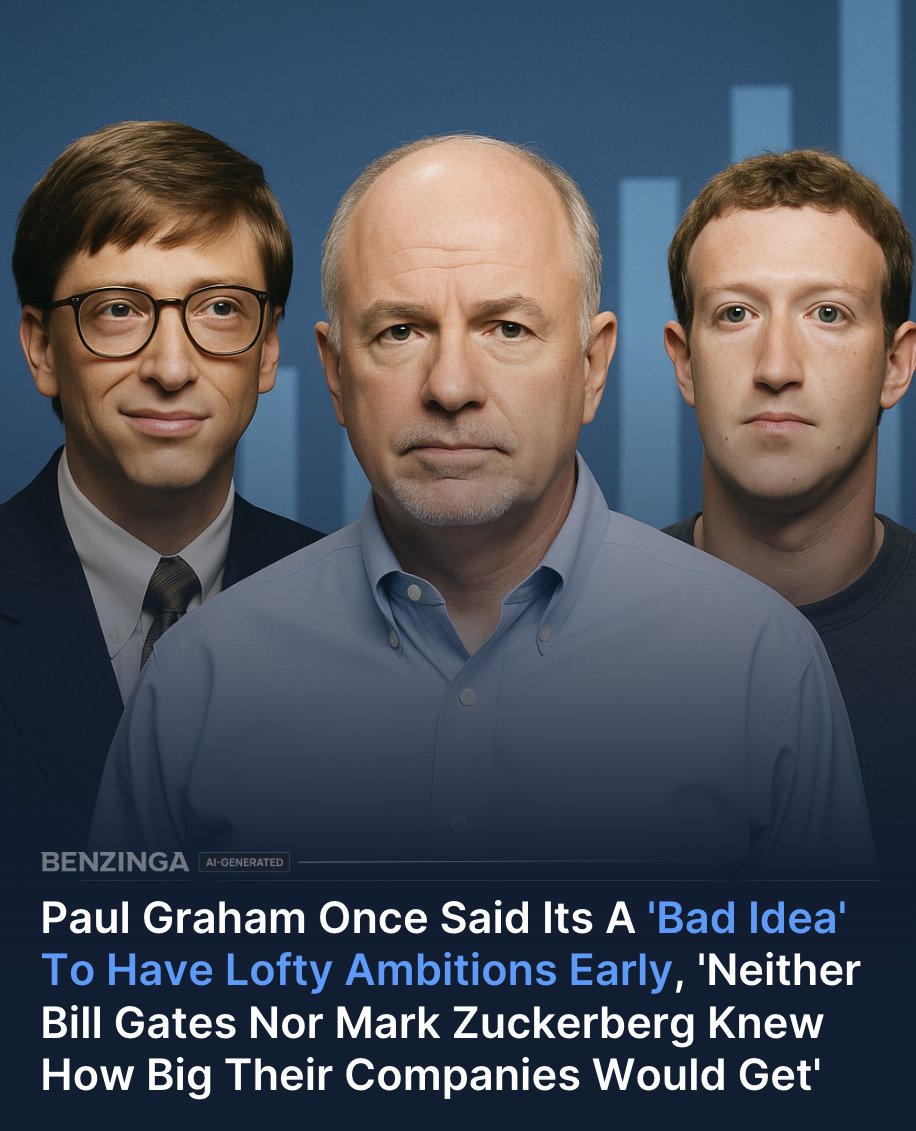[GUEST ACCESS MODE: Data is scrambled or limited to provide examples. Make requests using your API key to unlock full data. Check https://lunarcrush.ai/auth for authentication information.]  Benzinga [@Benzinga](/creator/twitter/Benzinga) on x 306.7K followers Created: 2025-07-19 02:59:49 UTC Paul Graham believes big companies don't start with big plans—they start with something small that works. In a 2012 keynote at Pycon, the Y Combinator co-founder said it's usually a mistake for entrepreneurs to start with lofty ambitions. Instead, he advised building something useful, even if it's small, and growing it over time. “Neither Bill Gates nor Mark Zuckerberg knew how big their companies would get. All they knew was that they were onto something,” Graham said. He warned that projecting too far into the future increases the risk of being wrong. “Maybe it’s a bad idea to have really big ambitions initially,” he added. Graham compared the ideal founder mindset to Columbus—heading west, not knowing what land they’ll find, but confident in the direction. He said it’s better to have a “blurry” vision than a fixed roadmap. His view runs counter to the Silicon Valley norm of blitz-scaling, but it aligns with his core philosophy: rapid iteration beats rigid planning. Founders who stay flexible and respond to real-world results tend to win. Jeff Bezos once said raising Amazon’s first million was the hardest part, reinforcing Graham’s point—early success comes from solving small problems well, not chasing grandeur from day one.  XXXXX engagements  **Related Topics** [mark zuckerberg](/topic/mark-zuckerberg) [bill gates](/topic/bill-gates) [y combinator](/topic/y-combinator) [$ghc](/topic/$ghc) [Post Link](https://x.com/Benzinga/status/1946404582768181624)
[GUEST ACCESS MODE: Data is scrambled or limited to provide examples. Make requests using your API key to unlock full data. Check https://lunarcrush.ai/auth for authentication information.]
 Benzinga @Benzinga on x 306.7K followers
Created: 2025-07-19 02:59:49 UTC
Benzinga @Benzinga on x 306.7K followers
Created: 2025-07-19 02:59:49 UTC
Paul Graham believes big companies don't start with big plans—they start with something small that works.
In a 2012 keynote at Pycon, the Y Combinator co-founder said it's usually a mistake for entrepreneurs to start with lofty ambitions. Instead, he advised building something useful, even if it's small, and growing it over time.
“Neither Bill Gates nor Mark Zuckerberg knew how big their companies would get. All they knew was that they were onto something,” Graham said. He warned that projecting too far into the future increases the risk of being wrong. “Maybe it’s a bad idea to have really big ambitions initially,” he added.
Graham compared the ideal founder mindset to Columbus—heading west, not knowing what land they’ll find, but confident in the direction. He said it’s better to have a “blurry” vision than a fixed roadmap.
His view runs counter to the Silicon Valley norm of blitz-scaling, but it aligns with his core philosophy: rapid iteration beats rigid planning. Founders who stay flexible and respond to real-world results tend to win.
Jeff Bezos once said raising Amazon’s first million was the hardest part, reinforcing Graham’s point—early success comes from solving small problems well, not chasing grandeur from day one.

XXXXX engagements
Related Topics mark zuckerberg bill gates y combinator $ghc